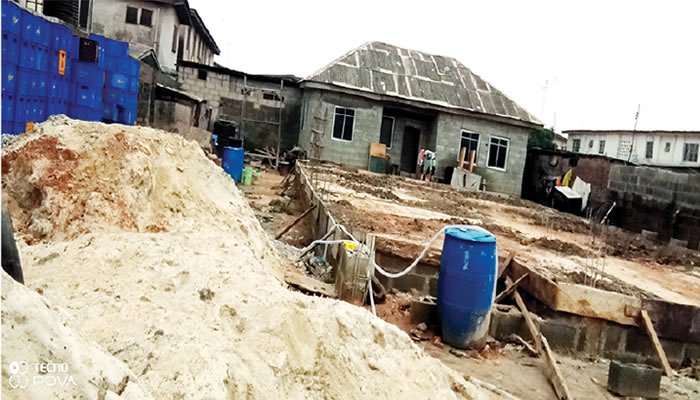
Some residents on Ajani Akingbogun Street, Akowonjo, in the Alimosho Local Government Area of Lagos State, have narrated how some imposters claiming to be officials of the Lagos State Ministry of Works and Infrastructure extorted money from people in the area.
According to them, the group usually visits the community anytime anyone is building a house.
The team was alleged to have gone to a three-storeyed building under construction last Thursday and collected huge sums of money.
Our correspondent, who partly witnessed the incident, overheard the men discussing with a woman in Yoruba and claiming to be from the Ministry of Works and Infrastructure.
They accused her of breaking a state law and demanded payment, threatening to pull down her house.
This reporter overheard the woman, Ruth Thomas-Giwa, begging them as she negotiated the alleged penalty fee.
“They collected N4,000 from me because I erected a pillar to fortify my house against flood,” she later told PUNCH Metro.
As our correspondent approached them, introduced himself and demanded their ID cards and their mission, they ran out of the compound, entered into a vehicle and drove away
Another resident, Olumide Oluga, whose father’s house was being renovated, also claimed the team stopped him from continuing the work and gave him a bill of N100, 000.
He said, “They came here and gave me a bill of N100,000 last week and said we should stop work on the building project. They even gave me a telephone number to call.”
A resident on Oke Street, Idowu Adeojo, said the group regularly visited the community anytime construction work was going on.
The Lagos State Commissioner for Works and Infrastructure, Dr Idris Salako, said the men were not officials of his ministry.
He said, “I am sure that they are not from this ministry.”
The Commissioner for Information and Strategy, Lagos State, Gbenga Omotosho, said the state government would never send agents around for such jobs.
He said, “The Lagos State Government does not go around asking for payment on buildings because things like this are handled professionally by the state.”





